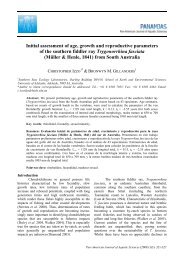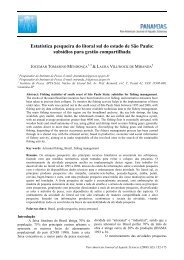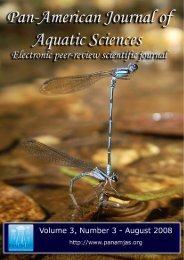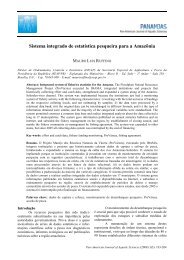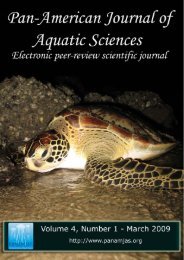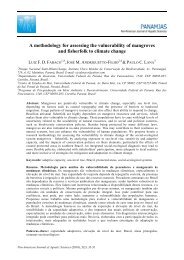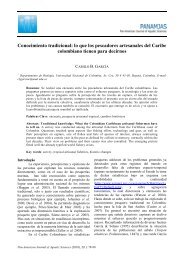Download full issue - PanamJAS
Download full issue - PanamJAS
Download full issue - PanamJAS
- No tags were found...
Create successful ePaper yourself
Turn your PDF publications into a flip-book with our unique Google optimized e-Paper software.
Historical assessment of extreme coastal sea state conditions insouthern Brazil and their relation to erosion episodesARTHUR A. MACHADO 1* , LAURO J. CALLIARI 1 , ELOI MELO 2 & ANTONIO H. F. KLEIN 31 Institute of Oceanography, Federal University of Rio Grande, Av Itália Km 8, CEP: 96201-900, Rio Grande, RS,Brazil.2 Engineering School, Federal University of Rio Grande, Av. Italia Km 8, CEP 96201-900, Rio Grande, RS, Brazil.3 Department of Geosciences, Federal University of Santa Catarina, Campus Universitário Trindade, CEP 88040-970,Florianópolis, SC, Brazil.* Corresponding author: oceaam@yahoo.com.brAbstract. Intense cyclonic weather systems in southern Brazil generate ocean storms which can,in a temporal scale varying from few hours to a day completely erode a beach profile from itsmaximum accretion state. Mid-latitude cyclogenesis with low pressure centers in the deep oceanand along the coast increases the intensity of the Mid-Atlantic storms causing storm surges andstorm waves. Preliminary results from a hindcast of wave energy at deep water (100 m),performed with a wave model using winds from reanalysis ( period 1979 - 2008), indicated a totalof 40 extreme events (wave height above 6 m). These events cause maximum erosion and surgeelevation on the order of 62.96m³/m and 1.827 m respectively. Four patterns of synoptic situationscapable of generating extreme events were identified. Among the 40 events, 53.66% had thetrajectory of Pattern II and 26.82% were associated to Pattern III, representing both 80% of thetotal. Coastal erosion episodes where mostly associated with Pattern II, while Pattern III causedthe highest surges. In a climate change scenario this study shows no important differences in theamount of the extreme events along the last thirty years.Key words: storm surge, extra-tropical cyclones, wave height, NCEP/NCAR ReanalysisResumo. Avaliação histórica das condições extremas de mar na costa do sul do Brasil e suarelação com episódios de erosão. Sistemas meteorológicos como ciclones extratropicais de altaintensidade que ocorrem no sul do Brasil geram ondas de alta energia, que podem levar um perfilde praia de um estágio máximo acrescivo ao máximo erodido em poucas horas. A ciclogênese emmédias latitudes, com centro de baixa pressão, contribui para a intensificação das tempestades doMeio do Atlântico, causando marés meteorológicas (storm surges) e ressacas (storm waves).Resultados preliminares para um estudo de energia das ondas em águas profundas (100 m),utilizando um modelo de ondas com dados de vento de reanálises (período 1979 - 2008),indicaram 40 eventos extremos (6 m de altura de onda). Alguns desses eventos geraram erosão de62,96 m³/m e 1,827 m de elevação do nível do mar. Foram identificados quatro padrões desituações sinóticas geradoras de alturas de ondas acima de 6m. Entre os 40 eventos, 53,66%tiveram a trajetória do Padrão II e 26,82% estavam associados ao Padrão III, ambos representando80% do total. Episódios de erosão costeira geralmente são associados ao Padrão II. Já o Padrão IIIé responsável pela maior elevação do nível do mar. Diferenças significativas na quantidade deeventos extremos ao longo dos últimos 30 anos não foram observadas.Palavras-chave: maré meteorológica, ciclone extra-tropical, altura de onda, NCEP/NCARReanálisesIntroductionAfter the accretion period which occursbetween December and March, storms beginning inApril start the erosion cycle of the southernBrazilian sandy beaches. Generally, erosion iscaused by extreme sea state events which combinehigh waves and high storm surges. Sinceastronomical tides have higher amplitude in thisregion during April, and the storms can last a fewPan-American Journal of Aquatic Sciences (2010), 5(2): 277-286




